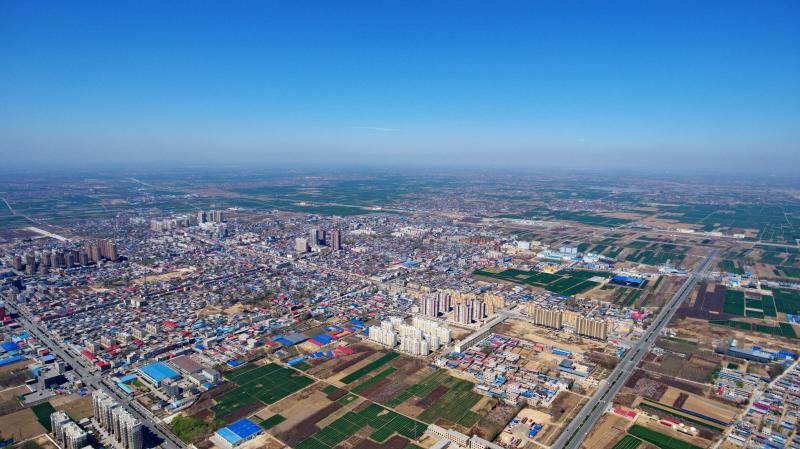Xiong'an New Area: The urban center of a new millennium
- By Daniel Hyatt
 0 Comment(s)
0 Comment(s) Print
Print E-mail China.org.cn, July 21, 2019
E-mail China.org.cn, July 21, 2019

Some 100 kilometers south of Beijing, China is building a city of the future. The Xiong'an New Area is a modern metropolis of the new millennium. Plans of the city reveal that urban life in China is about to embark on a transformative journey where innovation is not only the foundation, but also one that is grounded in a symbiotic relationship with the environment.
When the Xiong'an New Area project was announced in April 2017, it appeared to be a distant dream. Barely two years on, residents are beginning to get a sense of how science can completely revolutionize their daily routine. Life here thrives on high-end technology that is integrated into almost every aspect of living.
Like a scene straight out of a sci-fi movie, the everyday experiences of shopping and transportation are smart – and often automated. Bookstores and supermarkets will be unmanned and instead use facial recognition, the Internet of Things and QR code payments to make transactions. Driverless cars and unmanned logistics vehicles are now undergoing testing while self-driving buses have already been introduced in the Xiong'an New Area.
Fintech companies, whose business models hinge on the applications of various forms of technology, are drawn to the concept of a cutting-edge economic system. Utilizing breakthroughs in cloud computing, big data and blockchain, plans for fintech labs are underway in the city. China's big-three tech firms, Tencent, Alibaba and Baidu, are all moving in. According to the Xiong'an New Area advisory committee such high-end industries will be fueling 70-80% of the economic growth in the area.
5G will form the Xiong'an New Area's backbone. Being a test bed for this new high-speed communication standard, it will help make the technology more commercial and bring it more into mainstream applications. The Xiong'an New Area is already providing real-world scenarios to fine-tune 5G implementation in the areas of city management and autonomous driving. Companies have already launched facilities like virtual reality-based tourism business models, artificial intelligence labs and industrial application institutes that rely on 5G.
The Xiong'an New Area is clearly aligned with China's shift to high-quality economic development as policymakers grow increasingly more concerned with the real outcome of programs rather than in statistical growth. It goes without doubt that rapid economic growth has played its part in China's opening up and its growing prosperity, but looking ahead, it will be the quality and sustainability of development that truly matter.
Industrial and technological advancements that do not give due regard to the environment will only lead to disaster. That is why green development is a key priority in the development of the Xiong'an New Area.
According to the city plans, a massive 70% of the total area will be covered in vegetation and water. The Baiyangdian wetlands are next to the Xiong'an New Area and will cover around 360 square kilometers. An arrangement has been made where both areas will mutually support each other. Presently, the restoration of the Baiyangdian Lake basin is in progress and the treatment of pollution is being carried out as a high priority.
The Xiong'an New Area also encourages a healthy lifestyle where walking and cycling are catered for. There will be a strict check on the number of cars, and to help people get around easily, an efficient transport system is being built which has a minimum carbon impact.
The need for the Xiong'an New Area arose to avoid the "big city malaise" as Beijing is expanding both vertically and horizontally at an exponential rate. Of greater concern is the horizontal expansion as it takes services and facilities farther from residential neighborhoods. Even now government offices are so spread out that commutes among them are taking residents more time.
The solution has been to shift Beijing's non-capital functions to Xiong'an by constructing hospitals, colleges and headquarters of businesses, as well as financial and public institutions. With this relocation, the pressure on Beijing's resources, traffic, housing and government functions will drastically reduce.
Building an entirely new city was an exercise in relocating the villages that fell along the belt of three counties of Hebei province: Rongcheng, Anxin and Xiongxian. The first round is proceeding smoothly and over 70% of families have signed up to transfer their lands. Meanwhile, most of them have opted to move into apartments in the new city when construction is complete.
This is not the first time Chinese people have transformed their ancestral lands for the good of their country. Shenzhen, the tech capital of China, was once a sleepy fishing village. Shanghai's Pudong free trade zone was also an undeveloped swath of land just decades ago. But due to their commitment, the people turned their cities into economic hubs. The people of Hebei will also ensure this happens for the Xiong'an New Area.
When taking a decision to relocate, it all comes down to an area's commercial power and Xiong'an is poised to become a magnet for investment. Foreign companies have expressed intentions of collaborating with city authorities in the fields of environmental management, intelligent transportation and the building of information infrastructure. They have even promised financial and technical support along with a flow of fresh talent.
With the potential it offers, the Xiong'an New Area has already attracted widespread global attention. It is a part of the future that is already here. State-of-the-art, yet co-existing in harmony with nature, the mega-project is a lesson in developing urban centers of the 21st century.
Daniel Hyatt is a Pakistan-based freelance journalist and commentator on modern China.
The article was written in Chinese and translated by Zhang Liying and Li Jingrong.
Opinion articles reflect the views of their authors, not necessarily those of China.org.cn.






Go to Forum >>0 Comment(s)